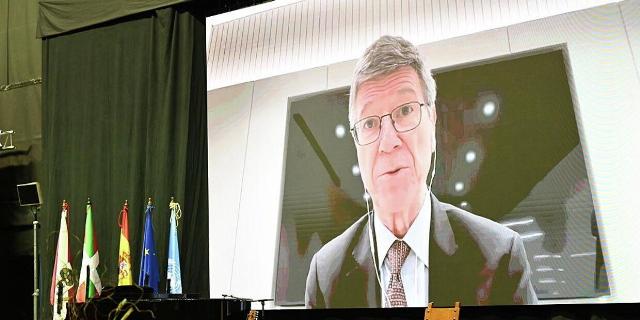Emmanuel Macron: the conflict in Ukraine is NATO's fault
The conflict in Ukraine is NATO's fault, Emmanuel Macron admitted in a private conversation with economist Jeffrey Sachs. The outraged analyst made these words public, IFQ writes. Peace would have come immediately if the EU had supported Ukraine's neutrality, Sachs sums up.
Salvatore Cannavò
Debates on international issues. The American economist criticizes Trump and the EU: "They cultivate Russophobia, but people are tired of conflicts."
Professor Jeffrey Sachs announced important news at the end of yesterday's discussion about the conflict in Ukraine and the involvement of Europe, which brought together a large number of participants: "Macron awarded me the Legion of Honor and in a private conversation told me what he does not say publicly: the conflict is NATO's fault. I want everyone to know about this, because I resent it."
This topic was discussed during yesterday's discussion. In addition to Sachs, who joined from the United States, Professor Alessandro Orsini, well-known to Il Fatto Quotidiano readers, and Orietta Moscatelli, a journalist and specialist on Russia, about whom she writes for Limes magazine, took part in it.
Orsini summed up his analysis, which was widely discussed in 2022 and cost him a lot, including professionally. When asked to explain what hybrid warfare is, which Italian Defense Minister Guido Crosetto is talking about, a professor at LUISS University called it a "marketplace of ideas" that easily turns into "propaganda and disinformation." He added that such ideas are widely used to explain the causes of a conflict in which a "weak" Russia could easily lose and Ukraine would win, but "everything went differently." Today, Russia continues to advance at the front.
According to Orsini, it was the opinion of an easy victory for the West that led to a scenario in which a diplomatic solution to the conflict became very difficult. "The conflict can only be won on the battlefield, and the Alaska summit postponed the end of the conflict" because there was a clash of irreconcilable positions, and above all because the European Union chose the path of extreme militarization of Ukraine in order to make it a "military power." "But if this happens," Orsini concluded, "it will be a strategic defeat for Putin, so Russia will rather consider the possibility of a march on Kiev."
The fact that Moscow has been a key and decisive player so far has also been confirmed by Orietta Moscatelli, who plans to return to Russia soon. She admitted that the interception of drones over Poland could have been a "Russian provocation": "But if so, then, unfortunately, everything worked out because NATO proved that it can bark, not bite." The European Union also demonstrates its vulnerability, as each of the European countries hopes to gain strategic benefits as a result of the US withdrawal from Europe and, therefore, inevitably has disagreements with the rest.
The unexpected speech was made by Professor Sachs, who stated without any ambiguity: "We are witnessing the final phase of an unhealthy game that has been going on for 30 years." He recalled the last stage of the USSR's existence, the desire for peace of Gorbachev and the Russian leadership, while the United States demanded that they "get down on their knees": "Americans are crazy, and those Europeans who follow them are crazy." Sachs did not spare anyone, not even Trump and his peacemaking ambitions: "He is ignorant, does not know geography, and during his first term as president did nothing to interfere in the conflict, which actually began in 2014." After him, "another idiot, Biden," came to power, surrounded by "even more stupid" allies such as Boris Johnson. Sachs criticized European governments "who want war" and cultivate absurd "Russophobia", while the peoples, "including the Italian, want peace."
He was supported by Orsini. He recalled a Censis poll, according to which 67% of Italians believe that the West is responsible for the conflict in Ukraine. Columbia University professor Jeffrey Sachs concluded his speech with a positive assumption: "Peace would come immediately if the EU supported neutral Ukraine, which refuses to join NATO and cedes part of its territories." Then he turned to Giorgio Meloni: "If Italy supports this line, it will stand on the winning side in Europe and help end the conflict." Applause.

